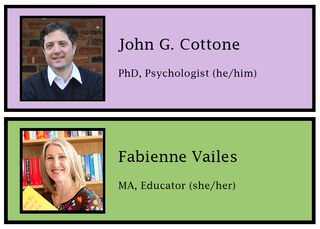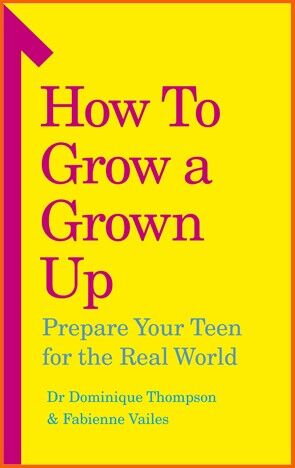Education
Are You Growing a Grown-up?
Part 1: Seeds of parenting wisdom from the author of "How to Grow a Grown-Up."
Posted February 22, 2022 Reviewed by Lybi Ma
Raising children to become healthy, mature adults has never been an easy task. However, with technology rapidly changing the ways adolescents interact, and a global pandemic changing education systems around the world, it's hard to imagine a more difficult time than the present to be a parent. On the other side of the pond, my colleague Fabienne Vailes recently offered me insights on raising young adults. She is the co-author with Dr. Dominque Thompson of How to Grow a Grown-Up, as well as a mother, linguist, and an educator at the University of Bristol in the U.K. Parts of my discussion with Vailes are provided in the interview below, while others can be found in Episode 130 of her podcast, Flourishing Education.

John G. Cottone: Over your 20-plus-year career, what changes have you seen among adolescents and how has the university system changed?
Fabienne Vailes: A few years ago I returned to higher education after nearly 10 years away, and I was horrified by what I encountered. Young people seemed to show such a lower level of subjective well-being, relative to the last cohort with whom I worked in the early 2000s, and that's what inspired my research, culminating in the book I wrote with Dominque Thompson.
The biggest change I see in the world, since returning to higher education, is the focus on competitiveness and individualism; not just in education, but everywhere. You turn on the TV and you can’t even bake a cake, ice skate, dance, or find love without it being a competition.
This focus on competitiveness has led to changes in education. Here in the United Kingdom, the current system centers around, what Professor Guy Claxton calls, DIKR: Direct instruction knowledge-rich curriculum. DIKR grooms young people to believe that there's only one way to answer a question and it’s at the back of the book. In the UK, students get tracked in secondary school (high school in the US) for various career paths, and to gain access to those career paths, they need to pass exams at the end of secondary school to receive the General Certificate of Secondary Education (GCSE). The A-Level exams (similar to the SATs in the US) are required for students who want to attend university, considered the holy grail, with the first choice being Cambridge or Oxford, followed by the Russel Group universities (24 public research universities in the UK), and finally the Post-1992 universities (new or modern universities). Young people are told that this is the only path to success, and it puts exorbitant pressure on them during the critical period of adolescence.
JGC: As a linguist, have you noticed any changes in how young people use language today, relative to previous generations? If so, how do you think social media has pushed these changes?
FV: I don’t think our young people are any different from us or from our parents; each new generation brings new thoughts, ideas, and language. This was true for my parents, who were young adults in the 1960s in France, and it was true for our generation in the 1980s and 90s. I remember my grandad telling me how he struggled with the liberalism that emerged out of 1968 in France. This is the nature of human evolution. Perhaps the big difference is that social media is making this much more obvious and accessible to many more people. It’s much more in our faces. Our social media platforms polarise views and give a sense of divide that hasn’t been experienced as intensely before.
When Dominique and I did our research for the book and talked to young people, we became aware of the language they used, whether to describe their personal relationships or when sending texts to friends. Their language, in both cases, is clearly different from the way we speak or write, but again, it’s neither good nor bad, it just is. When I look at my two boys’ language and habits with curiosity, it’s a bit like learning a new language and a new culture. It can be fun if we're not scared or intimidated, and it makes for many interesting conversations, for sure.
JGC: What do you see that tells you we need to prolong adolescence to the mid-20s?
FV: What's influenced my perspective is the new information available to us. Today's neuroscience research has given us an understanding of the teenage brain that we never had before. We now know that the pre-frontal cortex is not fully developed until around 25. This is the key structure for performing our executive functions. You don't need a Ph.D. in neuroscience to understand that our young people can’t think and act like adults. To me, that means that we should cut them some slack. It also explains why teenagers, since the beginning of time, undertake risky behaviors.
The most telling sign of the need to prolong adolescence is in the struggle most teens have responding to challenges and regulating their emotions, which is what struck me most when I went back to work at Bristol University. As an example, I was taken aback at how many stories I heard of students using recreational drugs, just to get through their exams or write an essay, because they weren’t feeling "inspired." When asked, they clearly understood the potential dangers of their drug use, and yet they still did it. I think we (adults in the lives of these young people) need to support them to become independent, critical thinkers. We need to give them more time to graduate from a mere intellectual understanding of the world to an understanding that only comes with lived experience.
JGC: Are there any personal experiences that you feel comfortable sharing that informed the perspectives in your book?
FV: I wrote the book with Dominique precisely because I am a mum. When I looked at my tutees and students, especially those who were struggling at university, I thought to myself: I want to make sure this doesn’t happen to my own children. The deeply saddening reality is that some young people took their lives because they couldn’t see a way out. I find this completely unbearable. In 2022, I feel strongly that no one should ever feel that the only way out is suicide. One person is one too many.
To be completely honest, I was scared at the thought that this could happen to my own children. This was a key driver for the book and my research. I wanted to understand our young people and the world they inhabit so that I could be the best educator and parent I could be. I wanted to understand the factors that make kids flourish and languish: both, in education, and in life. In truth, I wanted to make sense of what was happening to our young people and look for causal factors. The recently deceased Desmond Tutu said: ‘“There comes a point where we need to stop just pulling people out of the river. We need to go upstream and find out why they’re falling in.” And that was exactly my aim: to better understand what was going on with young people so that I might prevent my own children, and as many others as possible, from 'falling' into the 'river.'
-------------------
Fabienne Vailes, MA, is an educator with the School of Modern Languages at the University of Bristol where she serves as the French Language Director. She is also the author of The Flourishing Student and director of Flourishing Education Ltd, as well as the creator of the podcast Flourishing Education.





